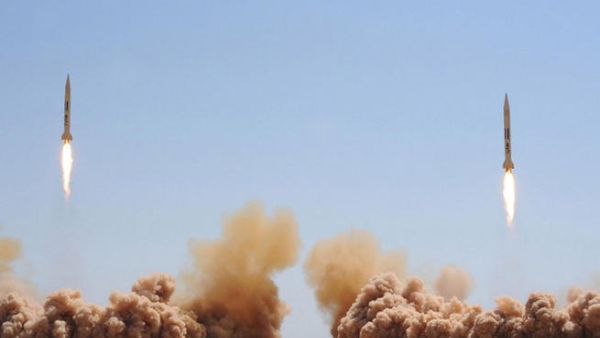Syria’s rebels stepped up attacks on strategic sites including a sprawling military complex in the country’s north Friday, while reports emerged that President Bashar Assad’s forces fired scud missiles at rebel areas for the second time.
Also Friday, Russian President Vladimir Putin told European leaders Russia did not seek to protect Assad but that only a negotiated solution could end the conflict and prevent chaos – an outcome that is looking increasingly unlikely.
NATO chief Anders Fogh Rasmussen said the Syrian army’s use of Scud-type missiles against rebels was a sign that the regime was approaching collapse.
“I can confirm that we have detected the launch of Scud-type missiles; we strongly regret that act,” Rasmussen said. “I consider it an act of a desperate regime approaching collapse.”
The latest launches were detected Thursday, a source close to NATO said. One of the Scuds apparently hit the rebel town of Marea, near Aleppo.
It was the second reported use of Scuds, 21 months into an anti-government uprising that opposition monitors say has claimed more than 44,000 lives.
U.S. and NATO officials first reported Syria’s use of Scud missiles one week ago, prompting a swift denial from the Syrian government.
Violence raged in flashpoints again across Syria Friday, with at least 82 people killed, according to a preliminary count from the Britain-based Syrian Observatory for Human Rights opposition group.
Syrian rebels attacked an air defense base protecting a military industrial compound in Al-Safira in the country’s north, as anti-government forces pushed forward in efforts to capture wider areas near the border with Turkey, an activist group said.
The Observatory said seven rebels were killed in the attack.
The town is home to a complex of military factories and lies just south of the city of Aleppo.
The rebels tried to storm the base but were pushed back, only to later shell some of the military factories, Observatory chief Rami Abdulrahman said.
The Observatory and other activists said rebels launched a wave of attacks on military checkpoints and posts in the central province of Hama.
An amateur video posted online by activists showed rebels tearing down Syrian and Palestinian flags from a checkpoint in the strategic village of Morek, along the Damascus-Aleppo highway. Regime troops usually raise the Palestinian flag on their posts. Abdulrahman said the military plants in Al-Safira are surrounded by army bases and posts to protect them. He said Friday’s clashes came three days after rebels captured a military warehouse in the area. It was later bombed by Syrian warplanes, killing nearly two dozen rebels.
In Aleppo, Syrian rebels fired warning shots at an airliner preparing to take off from Aleppo airport in the first direct attack on a civilian flight, a rebel commander said, warning that all civilian flights would now be considered targets. The commander, who gave his name only as Khaldoun, told Reuters by Skype that snipers from his brigade had hit the wheels of Syrian Airways flight RB201 Thursday.
“Those were warning shots,” he said. “We wanted to send a message to the regime that all their planes – military and civilian – are within our reach.”
Rebels accuse the government of using civilian aircraft to transport weapons and Iranian fighters they say are helping Assad’s forces. Insurgents have cut off many of the road links to Aleppo, Syria’s biggest city.
Meanwhile in Damascus, Palestinians who fled their homes in the Yarmouk refugee camp after much of it was captured by rebels continued returning home Friday. The refugees first began going back Thursday, after clashes between the army and the rebels subsided and a deal was reached for opposition forces to withdraw from the camp.
Fighting continued in the Damascus neighborhoods of Hajar Aswad and Tadamon, just outside Yarmouk, the Observatory said. Rebels also attacked army positions in the southern suburbs, including Mleiha and Chebaa, the group added. The areas are close to the Damascus International Airport and have witnessed heavy clashes over the past weeks.
An attack by Syrian rebels on an electricity pylon caused a power outage in several areas of Damascus, state television said, blaming “terrorists.”
The state-run news agency reported that “many gunmen” were killed in the suburb of Daraya, which has been subjected to shelling and attacks by government troops for weeks.
Syria’s conflict started 21 months ago as an uprising against Assad. It quickly morphed into a civil war, with rebels taking up arms to fight back against a bloody crackdown by the government.
Despite the violence, protesters took to the streets in several anti-regime areas Friday, renewing calls for Assad’s fall.
At an EU-Russia summit in Brussels, Russian President Vladimir Putin said Moscow does not want “chaos” in Syria and that it looked forward to seeing a democratic regime there: “We will try to pursue the public order in Syria and look forward to a democratic regime in Syria because this country is close to our borders.”
Putin for the second time in two days denied propping up Assad’s regime and appeared to acknowledge the possibility of change.
In separate comments Friday, Foreign Minister Sergei Lavrov said Russia refuses to act as an intermediary to talk Syrian President Bashar Assad into fleeing.
“We are not in the business of regime change. Some of the regional players were suggesting to us, ‘Why don’t you tell President Assad to leave? We will arrange for some safe haven for him,’” Lavrov told the state-owned Russia Today English-language TV channel.
“My answer is very simple: If indeed those who suggested this to us have this in mind, they should take it directly to President Assad. Why should they use us as a postman? If President Assad is interested, this must be discussed directly with him,” he said in comments recorded Wednesday.








